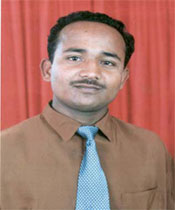Related Links
Case Updates
Krishna Adhikari
 On 6 June 2004, Krishna Prasad Adhikari, a resident of Fujel village of Gorkha District, was murdered in Chitwan District by Maoist cadres. Krishna Prasad was visiting his grandparents after having taken the SLC examinations, and he was abducted from Bakullahar Chowk by men who came on a motorcycle ...
On 6 June 2004, Krishna Prasad Adhikari, a resident of Fujel village of Gorkha District, was murdered in Chitwan District by Maoist cadres. Krishna Prasad was visiting his grandparents after having taken the SLC examinations, and he was abducted from Bakullahar Chowk by men who came on a motorcycle ... Maina Sunuwar
 Around 6 am on February 17, 2004, a group of RNA soldiers arrested Ms
Maina Sunuwar, a 15-year-old schoolgirl of Kharelthok VDC-6, Kavre
district. She disappeared since her arrest. Her family members, with
support from villagers and school where Maina was a student, visited
detention centers ...
Around 6 am on February 17, 2004, a group of RNA soldiers arrested Ms
Maina Sunuwar, a 15-year-old schoolgirl of Kharelthok VDC-6, Kavre
district. She disappeared since her arrest. Her family members, with
support from villagers and school where Maina was a student, visited
detention centers ... Sanjeev Kumar Karna
 Sanjeev Kumar Karna was one among the 11 persons arrested on October 8, 2003. On that fateful day, they had gone to attend a picnic program organized by the students at a place called Kariyachauri VDC-4, and from picnic, they went to Kataiya Chowri Area of Dhanusha district where they ate some food ...
Sanjeev Kumar Karna was one among the 11 persons arrested on October 8, 2003. On that fateful day, they had gone to attend a picnic program organized by the students at a place called Kariyachauri VDC-4, and from picnic, they went to Kataiya Chowri Area of Dhanusha district where they ate some food ... Arjun Bahadur Lama
Arjun Bahadur Lama, 48 years in age, permanent resident of Chhatrebas
VDC -5, Dapcha in Kavre district was abducted by a group of Maoist
cadres, three in number, on 29 April 2005 (2062.1.16 BS) from the
premises of Sri Krishna Secondary School at Chhatrebas VDC-1 of the
district.
» more
Hari Prasad Bolakhe
Hari Prasad Bolakhe, 35 (while missing) a permanent resident of Phulbari VDC-8, Kavre district, a pastor by profession, had been missing since the arrest December 27, 2003, was reportedly killed by security persons. A team of National Human Rights Commission discovered a human skeleton in a jungle ...
» more
Sarala Sapkota
Around 11 p.m. on July 15, 2004, a group of 12 armed soldiers arrested
Sarala Sapkota at her grandfather’s house. The family, who witnessed the
arrest, stated that soldiers gave Sarala no reason for her arrest.
After her arrest, Sarala’s family went to Baireni barracks and the DPO ...
» more
Birendra Shah
On the evening of 5 October 2007, Mr. Birendra Shah, 34, resident of Inruwasira VDC-8, Bara district, a local journalist of Bara district and correspondent of Nepal FM, Avenues Television and Dristi weekly, was abducted by Maoists from Pipara Bazaar in Kalaiya, the district headquarters of Bara ...
» more
Bishwanath Parajuli, Tom Nath Poudel and Dhan Bahadur Tamang
Three persons namely Bishwonath Parajuli (also called Nagendra
Parajuli), Tom Nath Poudel and Dhan Bahadur Tamang of Hasandaha VDC,
Morang were shot dead by the security personnel on 28 September 2004.
According to the eyewitnesses, other victims and the villagers, about 16
people were arrested ...
» more
Chot Nath Ghimire and Shekhar Nath Ghimire
Chot Nath Ghimire, a 58-year-old farmer, resident of Ishaneshor VDC-4,
Ratamate Majhpokhari of Lamjung district was allegedly arrested by the
Joint Security Forces of Joint Security Camp stationed at Bhorlatar VDC,
Lamjung district on February 2, 2002 (2058.10.20). The security camp
called Mr. ...
» more
Bhauna Tharu
Bhauna Tharu (Bhauna Chaudhary in the citizenship card), 21 years old
male (at the time of the incident; Date of Birthe: 8 September 1978),
son of Purna Bahadur Chaudhary, permanent resident of Sujanpur village,
Neulapur VDC-4, Bardiya district, and an employee of Rastriya Gobar Gas,
Gulariya, ...
» more
Review of the UPR recommendations-3 Transitional justice and impunity
AF and the AHRC welcome this focus on impunity and the commitments taken by Nepal. Addressing impunity and transitional justice requirements should be made the cornerstone of the government post-UPR action. Nevertheless, recent developments in Nepal have shown that the commitments to bring perpetrators of human rights violations to book and to establish the supremacy of the rule of law are still likely to go unheeded. Such moves are in contradiction to the promises made by the government to the international community. This requires immediate scrutiny from the international community to closely monitor the implementation of the government pledge to put an end to the culture of impunity, as well as renewed commitments from the part of the government to promptly implement the following recommendations in good faith, in a transparent manner.
"Take necessary steps to set up the Truth and Reconciliation Commission and the Commission on the Inquiry on Disappearances since the failure to act on human rights abuses undermines the respect for the rule of law" (Czech Republic)
More than a dozen countries have inquired about the government's plan to pass the bills establishing the transitional justice mechanisms mentioned in the Comprehensive Peace Agreement and recommended for such passing to occur without delay to establish accountability for conflict-related human rights abuses. AF and the AHRC are encouraged that the government has pledged that those bills should not include any form of amnesty for grave human rights violations and that it would ensure its independence from political interference, in line with international standards. The bills have been tabled before the Parliament for endorsement however, amendments have been introduced targeting core provisions prohibiting amnesty for those accused of gross human rights violations, in accordance with the government commitments. AF and the AHRC warn that scrapping the prohibition of amnesty would contribute to turn the commissions into paper tigers, unable to play a decisive role in the eradication of impunity and would be in clear contradiction to the international standards of transitional justice. We therefore urge the government to comply with its commitment to establish without delay strong and independent transitional justice commissions and to clearly ban all possibility of amnesty for those having committed human rights abuses during the conflict.
"Tackle impunity by investigating and prosecuting human rights violations and abuses committed by State and non-State actors during and since the conflict, implementing court orders including on the Nepal Army, and ending political interference (United Kingdom) "
In complement to transitional justice institutions, the criminal justice system of Nepal must be strengthened. The government indicated that it remains committed to implement court orders and agreed to the recommendations to implement the court orders related to conflict-time or present human rights violations. Nevertheless, there is no denying that since the end of the conflict, the persisting trend of non-implementation of court orders against alleged perpetrators has allowed accused of serious crimes to go scot-free. Members of the military, police forces and the Maoists accused of human rights violations during the conflict have remained above the reach of the law, violating the rights of victims to access legal remedies. That court orders have to be binding to all, without distinction, is one of the foundations of a functioning criminal justice system able to bring to book human rights violations and this much-needed commitment must therefore be translated into concrete actions without delays. Nevertheless, four months after accepting this recommendation, no concrete action has been taken to implement pending court orders. The nomination of a minister of Information and Communication against whom a murder case has been registered following a Supreme Court order for his alleged involvement in the disappearance and murder of a school teacher, Arjun Lama, during the conflict raises questions toward the government's commitment to respecting the authority of the courts of justice.
By the same token, the government accepted recommendations to put an end to political interference in the course of justice. Political intervention in the due process of justice has been a major factor contributing to the impunity of human rights violations. We are concerned to see that in spite of the government commitment to stop political interference, the Home Minister recently declared that his office was planning to withdraw cases filed against Maoist cadres from the time of the conflict, which may include cases of grave human rights violations. This makes a mockery of the commitments taken to a zero-tolerance to impunity.
The government should size up the requirements of a commitment to accountability and accordingly put an end to the inclinations to undermine the independence and authority of justice and grant amnesty to alleged human rights abusers. Similarly, it is the duty of the international community not to settle for mere lip-service in the fight against impunity but insist upon immediate action to turn this token agreement into a comprehensive and transparent set of actions.
"Start the investigation of all outstanding allegations of human rights violations committed during or after the conflict and to bring perpetrators to justice in proceedings which meet international standards" (Netherlands)
Recommendations specifically related to investigations of human rights violations have not been explicitly accepted by Nepal who insists that “allegations of human rights violations have been investigated in accordance with the laws of Nepal”. This is a complete denial of the reality that in a majority of allegations of human rights violations, the lack of professional, thorough and independent investigation fostered impunity. The AHRC and AF recall that it is of crucial importance that Nepal takes concrete and specific commitments to better the way investigations into allegations of human rights violations are being conducted, including by developing a system of accountability for police officers who fail to undertake satisfactory and credible investigations into allegations of human rights violations. Additionally, the government should show a strong political will to have the past crimes properly investigated and prosecuted and send clear and imperative instructions to the police and prosecutions system to properly register and investigate allegations of human rights violations.
Advocacy Forum and the Asian Human Rights Commission will continue to closely monitor the state of implementation of the UPR recommendations in Nepal.
« Back to overview
"Take necessary steps to set up the Truth and Reconciliation Commission and the Commission on the Inquiry on Disappearances since the failure to act on human rights abuses undermines the respect for the rule of law" (Czech Republic)
More than a dozen countries have inquired about the government's plan to pass the bills establishing the transitional justice mechanisms mentioned in the Comprehensive Peace Agreement and recommended for such passing to occur without delay to establish accountability for conflict-related human rights abuses. AF and the AHRC are encouraged that the government has pledged that those bills should not include any form of amnesty for grave human rights violations and that it would ensure its independence from political interference, in line with international standards. The bills have been tabled before the Parliament for endorsement however, amendments have been introduced targeting core provisions prohibiting amnesty for those accused of gross human rights violations, in accordance with the government commitments. AF and the AHRC warn that scrapping the prohibition of amnesty would contribute to turn the commissions into paper tigers, unable to play a decisive role in the eradication of impunity and would be in clear contradiction to the international standards of transitional justice. We therefore urge the government to comply with its commitment to establish without delay strong and independent transitional justice commissions and to clearly ban all possibility of amnesty for those having committed human rights abuses during the conflict.
"Tackle impunity by investigating and prosecuting human rights violations and abuses committed by State and non-State actors during and since the conflict, implementing court orders including on the Nepal Army, and ending political interference (United Kingdom) "
In complement to transitional justice institutions, the criminal justice system of Nepal must be strengthened. The government indicated that it remains committed to implement court orders and agreed to the recommendations to implement the court orders related to conflict-time or present human rights violations. Nevertheless, there is no denying that since the end of the conflict, the persisting trend of non-implementation of court orders against alleged perpetrators has allowed accused of serious crimes to go scot-free. Members of the military, police forces and the Maoists accused of human rights violations during the conflict have remained above the reach of the law, violating the rights of victims to access legal remedies. That court orders have to be binding to all, without distinction, is one of the foundations of a functioning criminal justice system able to bring to book human rights violations and this much-needed commitment must therefore be translated into concrete actions without delays. Nevertheless, four months after accepting this recommendation, no concrete action has been taken to implement pending court orders. The nomination of a minister of Information and Communication against whom a murder case has been registered following a Supreme Court order for his alleged involvement in the disappearance and murder of a school teacher, Arjun Lama, during the conflict raises questions toward the government's commitment to respecting the authority of the courts of justice.
By the same token, the government accepted recommendations to put an end to political interference in the course of justice. Political intervention in the due process of justice has been a major factor contributing to the impunity of human rights violations. We are concerned to see that in spite of the government commitment to stop political interference, the Home Minister recently declared that his office was planning to withdraw cases filed against Maoist cadres from the time of the conflict, which may include cases of grave human rights violations. This makes a mockery of the commitments taken to a zero-tolerance to impunity.
The government should size up the requirements of a commitment to accountability and accordingly put an end to the inclinations to undermine the independence and authority of justice and grant amnesty to alleged human rights abusers. Similarly, it is the duty of the international community not to settle for mere lip-service in the fight against impunity but insist upon immediate action to turn this token agreement into a comprehensive and transparent set of actions.
"Start the investigation of all outstanding allegations of human rights violations committed during or after the conflict and to bring perpetrators to justice in proceedings which meet international standards" (Netherlands)
Recommendations specifically related to investigations of human rights violations have not been explicitly accepted by Nepal who insists that “allegations of human rights violations have been investigated in accordance with the laws of Nepal”. This is a complete denial of the reality that in a majority of allegations of human rights violations, the lack of professional, thorough and independent investigation fostered impunity. The AHRC and AF recall that it is of crucial importance that Nepal takes concrete and specific commitments to better the way investigations into allegations of human rights violations are being conducted, including by developing a system of accountability for police officers who fail to undertake satisfactory and credible investigations into allegations of human rights violations. Additionally, the government should show a strong political will to have the past crimes properly investigated and prosecuted and send clear and imperative instructions to the police and prosecutions system to properly register and investigate allegations of human rights violations.
Advocacy Forum and the Asian Human Rights Commission will continue to closely monitor the state of implementation of the UPR recommendations in Nepal.
























Join Us